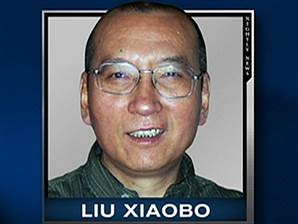China refuses cancer treatment abroad for Nobel winner Liu Xiaobo.
Nobel prize winning Chinese dissident Liu Xiaobo has been refused permission to travel overseas to receive cancer treatment.
Liu, 61, was granted medical parole and released from jail last week after he was diagnosed with late-stage cancer of the liver.
A Chinese vice minister of justice met with diplomats from the US, Germany and EU on Thursday to brief them about Liu's case, and told the diplomats that Liu can't travel abroad for treatment because he is too sick to travel, according to a source familiar with the meeting.
Liu had been serving an 11-year prison sentence for "inciting subversion of state power" in Jinzhou, near the city of Shenyang in northeastern China.
His case has come under an international spotlight amid allegations from his supporters that he had become gravely ill because his cancer wasn't treated in prison.
In a statement released Wednesday, Shenyang authorities appeared to attempt to dispel this speculation, saying his cancer was diagnosed less than a month ago, on June 7, after a routine check-up found unusual symptoms on May 31.
A medical team comprised of eight renowned oncologists have seen Liu seven times and formed a treatment plan, it said, adding that the hospital has invited traditional Chinese medicine (TCM) practitioners to join the team at the request of Liu's family.
US ambassador's appeal
Terry Branstad, the new US ambassador to China, on Wednesday urged Beijing to let Liu seek cancer treatment elsewhere.
In his first public remarks since arriving in China, the former Iowa governor told reporters that he hoped the two sides could work together to address Liu's condition.
"It's very serious," he said. "Obviously, our hearts go out to him and his wife and we're interested in doing what can be done to see if it's possible. We Americans would like to see him have the opportunity for treatment elsewhere, if that could be of help."
A Chinese foreign ministry spokesman dismissed the ambassador's appeal.
"Liu Xiaobo is a Chinese citizen," said Lu Kang at a regular press briefing. "Why should we discuss his case with other countries?"
Liu's plight has become a rallying point for activists in Hong Kong, which is hosting Chinese President Xi Jinping as part of festivities to mark 20 years of Chinese rule in the former British colony.
A video posted Wednesday by an overseas Chinese news website Boxun known for its access to Chinese government sources, appeared to show Liu working, exercising and meeting visiting family members in prison.
It also shows him receiving medical check-ups and treatment in prison and at hospitals.
Liu could be heard describing how prison officials had been taking good care of him, especially his health, and expressing his gratitude to them.
The statement from Shenyang's judicial authorities said that Liu's wife, Liu Xia was staying with him at the hospital.
"Liu and his family members are satisfied with the work and treatment by the prison and the hospital," the statement said.
The statement also said Liu had a history of hepatitis B before imprisonment and prison authorities had provided him with an annual physical examination as well as monthly checkup - and no abnormal conditions had been found before the recent diagnosis.
A prolific writer and longtime activist, Liu had been in and out of jail since the bloody crackdown on pro-democracy protesters in Beijing's Tiananmen Square in 1989.
His most recent conviction on Christmas Day 2009 stemmed from his co-authorship of Charter 08, a manifesto calling for political reform and human rights in China.
In 2010, while in prison, Liu was awarded the Nobel Peace Prize for "his long and nonviolent struggle for fundamental human rights in China."
Source: CNN




Comments
Post a Comment